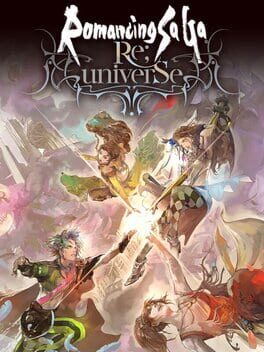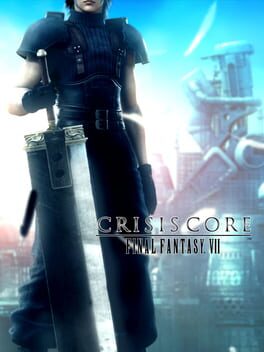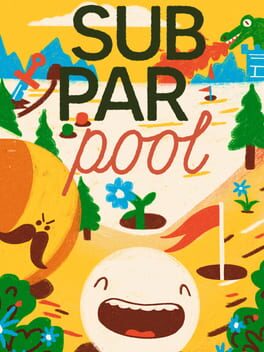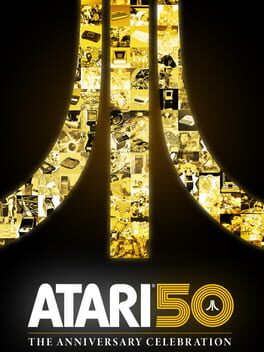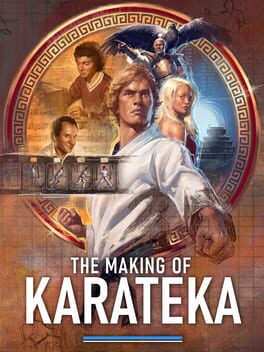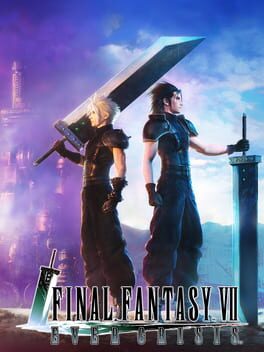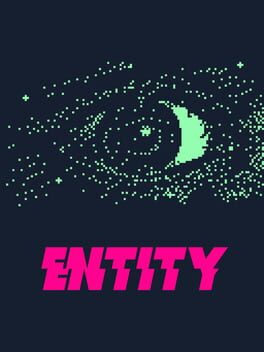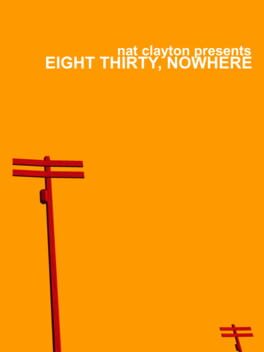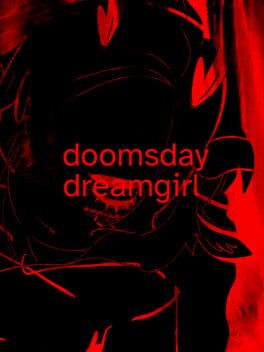Fredison
30 reviews liked by Fredison
This is about as good as it gets for gacha games, but these sorts of games probably max out at around three stars in my estimation.
Re;UniverSe is generous with premium currency and has an ingenious progression system that treats different versions like 'skins' with different abilities and stats bonuses modifying the same base character parameters that can be grown using any version of the character.
But you hardly need to worry about pulling the best units. The game allows for a great deal of flexibility even in tackling the most difficult content. Power creep is a given, but Re;UniverSe is rewarding even if you choose not to spend a penny on it.
This might go without saying, but this isn't exactly a game for those who are not fans of the SaGa franchise, but those who like a pixel aesthetic might find themselves checking out the mainline series games because of this mobage rather than the other way around.
The biggest drawback of the game is, despite being grind-heavy, it doesn't offer any auto-repeat functionality nor is it on the roadmaps. But Bluestacks users might find a clever way to turn Re;UniverSe into something of an idle game, how it was meant to be played.
Re;UniverSe is generous with premium currency and has an ingenious progression system that treats different versions like 'skins' with different abilities and stats bonuses modifying the same base character parameters that can be grown using any version of the character.
But you hardly need to worry about pulling the best units. The game allows for a great deal of flexibility even in tackling the most difficult content. Power creep is a given, but Re;UniverSe is rewarding even if you choose not to spend a penny on it.
This might go without saying, but this isn't exactly a game for those who are not fans of the SaGa franchise, but those who like a pixel aesthetic might find themselves checking out the mainline series games because of this mobage rather than the other way around.
The biggest drawback of the game is, despite being grind-heavy, it doesn't offer any auto-repeat functionality nor is it on the roadmaps. But Bluestacks users might find a clever way to turn Re;UniverSe into something of an idle game, how it was meant to be played.
This is the one gacha game I've consistently played. It's actually pretty great and F2P friendly as far as they go, shame it's still a gacha at the end of the day. Normally it would get a 3 star, but it gets an extra half star for having some of the prettiest and rawest art and character alts I've ever seen. SaGa already has strong character designs, but Re;Universe's art does them perfect justice and then some. Shoutouts to the artists behind the alts for Asellus, Gustave XIII, Katarina, and Undine, you all are doing god's work.
Nothing Squeenix ever does will make me think Zack Fair is good and/or cool. In fact, the more I learn about him the more I start to actively dislike him.
There is a part of me that feels fundamentally opposed to all the "Compilation of Final Fantasy VII" stuff because FF7 on its own is such an exquisitely self-contained thing. Like, they did a great job with it! We don't need every little detail explained and expanded upon! It frequently makes things worse! Sometimes you do still end up with something that is Cool and Fun (Advent Children) but mostly you end up with stuff that is Bad and Sucks (Crisis Core).
I didn't realize just how much this game pushes Zack and Aerith together. I had always assuming the fandom shipping them was based on some crumbs but they are pretty clearly Together in this, huh. I am choosing to ship Zack with Tseng out of pure spite because both Aerith and Cloud deserve better than this dumpster boy.
Genesis constantly dropping in to quote a play is very stupid and funny. Genesis walked so V Devilmaycryfive could run.
weird prank from squeenix to name the trans woman "Cissnei" but okay
There is a part of me that feels fundamentally opposed to all the "Compilation of Final Fantasy VII" stuff because FF7 on its own is such an exquisitely self-contained thing. Like, they did a great job with it! We don't need every little detail explained and expanded upon! It frequently makes things worse! Sometimes you do still end up with something that is Cool and Fun (Advent Children) but mostly you end up with stuff that is Bad and Sucks (Crisis Core).
I didn't realize just how much this game pushes Zack and Aerith together. I had always assuming the fandom shipping them was based on some crumbs but they are pretty clearly Together in this, huh. I am choosing to ship Zack with Tseng out of pure spite because both Aerith and Cloud deserve better than this dumpster boy.
Genesis constantly dropping in to quote a play is very stupid and funny. Genesis walked so V Devilmaycryfive could run.
weird prank from squeenix to name the trans woman "Cissnei" but okay
One of the better digital puzzle games that are out there. Yes there is a lot of DLC, but there are almost 100 puzzles that are offered for free and through in-game currency, plus monthly challenge puzzles every single month.
I don't even mind paying money for the DLC as they usually go on sale for at least 75%-90% off during the big holiday sales. Plus I know I'm getting my money's worth for the time invested.
I don't even mind paying money for the DLC as they usually go on sale for at least 75%-90% off during the big holiday sales. Plus I know I'm getting my money's worth for the time invested.
Subpar Pool
2023
Although this is a solidly decent way to spend some time, it feels like the more you push up against the sides of its design the more it ends up disappointing. The core is great: golf-pool is a very clever design, and the various ball and course variants are inventive and fun. But the challenges that drive the meta-progression and focus the actual play... they just aren't good! They veer wildly from the trivial to the extremely difficult, with the latter largely requiring a long run of pure luck to beat rather than any particular skill. And it's a shame, because the core gameplay just isn't quite enough to motivate the player to dive into it over and over on its own.
What an insanely impressive collection. Atari 50 is an anniversary celebration and game collection that should be studied and taken note of for any game collection in the future. Despite game selection being a mixed bag of peaks and valleys, the one area this game truly aces everything is in its presentation. Sure, you can play all games at any time you want, but you can also go through an interactive timeline of important moments in Ataris history. From their founding and dominance of the arcades, to their struggle to retain relevance in the 90's. These interactive timelines don't just let you play the games, it let's you look at concept art and design for these games. Old commercials from the Era, full print news ads, direct interviews with the original programmers of these games! Hell, they even let you play a decent chunk of cancelled games who had finished prototypes. Developer Digital Eclipse truly went above and beyond to pay tribute to the first game company that started it all, and in return, despite the quality being everywhere, genuinely gave me a newfound respect for the company. If $40 for this collection seems too steep for you, grab it when it's on sale because this does still warrant going through.
Omori
2020
Recommended by XenonNV as part of this list.
Partway through OMORI it dawned on me that there's a timeline where this game managed to release when I was in high school and I would've 100% made it a core facet of my personality for years.
OMORI is more likely than not the game that comes to everyone's mind when they think of the quintessential "Quirky Depression Earthbirth RPG", the hypothetical dead horse that encapsulates a lot of people's gripes with the modern indie scene and all it's eccentricities, and, to concede to that stereotyped image somewhat, it's for the most part true. OMORI is part lighthearted and surreal RPG about the titular main character and his adventures in the wonderfully quirky dream world of Headspace, and part mental health story about Omori's real-life counterpart Sunny and his struggles in the mundane reality of Faraway Town with his own mental health and relationships. The primary issue with OMORI however is not really with it's oft-maligned aesthetic or subject matter, but rather the fact that it's a complete tonal mess.
Headspace, as a dream world inside of Sunny's head, is obviously allowed to be a little surreal, as it's where most of the game's Earthbound DNA is apparent, from it's cutesy enemies to it's fun cast of eccentric NPCs and elevated sense of reality where anything goes. It's where 90% of OMORI takes place and is, for the most part, incredibly charming and fun. The tonal issues start to become apparent though when the Headspace sections lead into the Faraway Town segments, where, despite supposedly taking place in reality, still have a little too much whimsy and Earthbound-esque atmosphere. There's still wacky NPCs to talk to and goofy part-time jobs to have, which, while still enjoyable, isn't enough of a contrast to Headspace and doesn't mesh well with the relatively grounded and serious interpersonal drama between the core cast that revolves around grief and loss. It results in OMORI feeling like two disparate Quirky Earthbound-likes being duct-taped together without any real cohesiveness between the two halves, and only causes more issues down the line when the plot in Faraway town starts to actually go somewhere.
Headspace initially starts off as a low-stakes kid's adventure, which is perfectly fine for the Prologue, where it uses that initial impression to disarm the player when they first enter Faraway Town in the real world, but as is soon made apparent, Headspace is pure fluff, a complete nothing-burger that only really serves to pad out the runtime. Compared to the snappy pace and relative brevity of Faraway Town, Headspace tends to drag on for hours at a time with absolutely jack-shit happening, both literally and thematically. The various sprite animations, fancy textbox effects and UI is very charming and appealing at first, but the frequent use of them & their annoying length results in a start-and-stop gameplay flow that delights in wasting your time, and it's an issue that only gets worse as the game goes on, where long stretches of overly-goofy filler plot happen without anything substantive to bite into, that do nothing but pad out the runtime so the game can hit an arbitrary length quota. In addition to this, the idea of Headspace reflecting Sunny's inner thoughts is frankly underutilized, when that connection to the main character's subconscious could've been used to give the lengthy Headspace segments some more weighty thematic story relevance beyond simple visual callbacks to Faraway Town.
Despite the long stretches of nothing filler that feel like having a sugar crash, when OMORI wants to get serious, it can actually deliver more often than not. The subtle underlying horror of Headspace is pretty effective when it wants to be, and the drama of Faraway Town, while coming across like an afterschool PSA more often than not, is actually quite engaging and emotionally competent, but because OMORI is trying to maintain it's pastel Sanrio Lo-Fi Kawaii Future Bass Tumblr aesthetic at all times, this results in even the serious moments lacking punch because of the fact it's edges have been sanded down as smooth as possible for the sake of palatability. This is made most apparent with it's final plot twist at the very end of the game, which, without going into spoilers, is an insanely dark and out-of-left-field bout of tonal whiplash that is not only a massive misstep in the solid framework of the game's plot up until then, but is scrapping against the game's Instagram Self-Care™ Awareness Post-ass final message of overcoming depression and self-doubt by not being afraid to rely on your friends for help. It's way too big of an elephant to ignore and not something you can just drop in the player's lap and treat with the same levity with which the more mundane mental health struggles are in the plot. It's the most frustrating aspect of OMORI by far because I can see how it could work! It's not even presented badly in-game (in fact, the reveal is one of my favorite moment of the game bar none), but it's consistent adherence to the vibe initially established by Headspace ends up dragging what should be a master-class twist down hard.
OMORI is a frustrating, mixed bag of a game I want to like more than I do. It's playing all the right notes, and even manages to tug at my worn-out heartstrings with a surprising frequency, and I can see the appeal behind it; how it's managed to gather such a devoted fanbase that was emotionally wrecked by OMORI's style and presentation. However, it's too bloated, too messy and too toothless to make the landing it desperately wants to make. The video game equivalent of eating raw sugar by the handful.
Partway through OMORI it dawned on me that there's a timeline where this game managed to release when I was in high school and I would've 100% made it a core facet of my personality for years.
OMORI is more likely than not the game that comes to everyone's mind when they think of the quintessential "Quirky Depression Earthbirth RPG", the hypothetical dead horse that encapsulates a lot of people's gripes with the modern indie scene and all it's eccentricities, and, to concede to that stereotyped image somewhat, it's for the most part true. OMORI is part lighthearted and surreal RPG about the titular main character and his adventures in the wonderfully quirky dream world of Headspace, and part mental health story about Omori's real-life counterpart Sunny and his struggles in the mundane reality of Faraway Town with his own mental health and relationships. The primary issue with OMORI however is not really with it's oft-maligned aesthetic or subject matter, but rather the fact that it's a complete tonal mess.
Headspace, as a dream world inside of Sunny's head, is obviously allowed to be a little surreal, as it's where most of the game's Earthbound DNA is apparent, from it's cutesy enemies to it's fun cast of eccentric NPCs and elevated sense of reality where anything goes. It's where 90% of OMORI takes place and is, for the most part, incredibly charming and fun. The tonal issues start to become apparent though when the Headspace sections lead into the Faraway Town segments, where, despite supposedly taking place in reality, still have a little too much whimsy and Earthbound-esque atmosphere. There's still wacky NPCs to talk to and goofy part-time jobs to have, which, while still enjoyable, isn't enough of a contrast to Headspace and doesn't mesh well with the relatively grounded and serious interpersonal drama between the core cast that revolves around grief and loss. It results in OMORI feeling like two disparate Quirky Earthbound-likes being duct-taped together without any real cohesiveness between the two halves, and only causes more issues down the line when the plot in Faraway town starts to actually go somewhere.
Headspace initially starts off as a low-stakes kid's adventure, which is perfectly fine for the Prologue, where it uses that initial impression to disarm the player when they first enter Faraway Town in the real world, but as is soon made apparent, Headspace is pure fluff, a complete nothing-burger that only really serves to pad out the runtime. Compared to the snappy pace and relative brevity of Faraway Town, Headspace tends to drag on for hours at a time with absolutely jack-shit happening, both literally and thematically. The various sprite animations, fancy textbox effects and UI is very charming and appealing at first, but the frequent use of them & their annoying length results in a start-and-stop gameplay flow that delights in wasting your time, and it's an issue that only gets worse as the game goes on, where long stretches of overly-goofy filler plot happen without anything substantive to bite into, that do nothing but pad out the runtime so the game can hit an arbitrary length quota. In addition to this, the idea of Headspace reflecting Sunny's inner thoughts is frankly underutilized, when that connection to the main character's subconscious could've been used to give the lengthy Headspace segments some more weighty thematic story relevance beyond simple visual callbacks to Faraway Town.
Despite the long stretches of nothing filler that feel like having a sugar crash, when OMORI wants to get serious, it can actually deliver more often than not. The subtle underlying horror of Headspace is pretty effective when it wants to be, and the drama of Faraway Town, while coming across like an afterschool PSA more often than not, is actually quite engaging and emotionally competent, but because OMORI is trying to maintain it's pastel Sanrio Lo-Fi Kawaii Future Bass Tumblr aesthetic at all times, this results in even the serious moments lacking punch because of the fact it's edges have been sanded down as smooth as possible for the sake of palatability. This is made most apparent with it's final plot twist at the very end of the game, which, without going into spoilers, is an insanely dark and out-of-left-field bout of tonal whiplash that is not only a massive misstep in the solid framework of the game's plot up until then, but is scrapping against the game's Instagram Self-Care™ Awareness Post-ass final message of overcoming depression and self-doubt by not being afraid to rely on your friends for help. It's way too big of an elephant to ignore and not something you can just drop in the player's lap and treat with the same levity with which the more mundane mental health struggles are in the plot. It's the most frustrating aspect of OMORI by far because I can see how it could work! It's not even presented badly in-game (in fact, the reveal is one of my favorite moment of the game bar none), but it's consistent adherence to the vibe initially established by Headspace ends up dragging what should be a master-class twist down hard.
OMORI is a frustrating, mixed bag of a game I want to like more than I do. It's playing all the right notes, and even manages to tug at my worn-out heartstrings with a surprising frequency, and I can see the appeal behind it; how it's managed to gather such a devoted fanbase that was emotionally wrecked by OMORI's style and presentation. However, it's too bloated, too messy and too toothless to make the landing it desperately wants to make. The video game equivalent of eating raw sugar by the handful.
Digital Eclipse's 'interactive documentary' formula is really something else and although I had a good time learning all the stuff about the development of Karateka and Deathbounce I'm not massively fussed about actually playing either game. When one of these is released about a game I'm super into, it'll be something else.
Also, how the fuck is Mechner 59 years old? Digital Eclipse should do a Gold Series documentary on his skincare routine.
Also, how the fuck is Mechner 59 years old? Digital Eclipse should do a Gold Series documentary on his skincare routine.
Although I love the idea of this "Gold Master Series" of documentaries and its importance in video game history preservation, as a product, I feel like some improvements can be made in the future.
There hasn't seemed to be a lot of editorial choices in what to put or to omit from the game here. Everything and the kitchen sink is thrown in, which results in a lot of correspondences and interviews that are repetitive or flat out boring.
It generally feels like the story of Karateka is not that interesting to tell apart from a few fascinating tidbits.
I'm super glad this exists, and it is a polished product, but it did outstay its welcome since it didn't always aim for quality in historical content, but quantity and completeness.
On the upside, the next documentary appears to be about a game designer and a bunch of his games which seems like a fantastic idea. It might just fix all the gripes I had with this first experiment in innovative documentary by having a lot more material to go over.
There hasn't seemed to be a lot of editorial choices in what to put or to omit from the game here. Everything and the kitchen sink is thrown in, which results in a lot of correspondences and interviews that are repetitive or flat out boring.
It generally feels like the story of Karateka is not that interesting to tell apart from a few fascinating tidbits.
I'm super glad this exists, and it is a polished product, but it did outstay its welcome since it didn't always aim for quality in historical content, but quantity and completeness.
On the upside, the next documentary appears to be about a game designer and a bunch of his games which seems like a fantastic idea. It might just fix all the gripes I had with this first experiment in innovative documentary by having a lot more material to go over.
